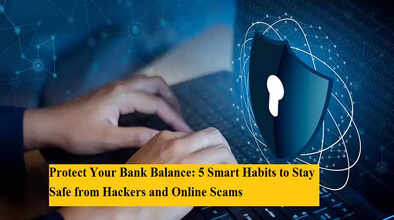Protect Your Bank Balance: 5 Smart Habits to Stay Safe from Hackers and Online Scams

Online scams and digital frauds are becoming increasingly common in India. From phishing emails to fake apps and fraudulent links, cybercriminals are constantly finding new ways to steal people’s personal and financial information. Despite repeated government warnings and awareness campaigns, thousands still fall victim to such scams every year.
However, you can protect yourself from hackers by adopting a few simple but powerful habits. These practices not only safeguard your bank balance but also ensure your overall digital security. Let’s take a look at five essential habits you must follow to stay secure online.
1. Enable Two-Factor Authentication (2FA) on Every Account
Two-Factor Authentication, commonly known as 2FA, is one of the most effective tools to secure your accounts. Social media apps, email services, and even banking platforms now offer this feature.
When you activate 2FA, logging in requires not just your password but also a secondary verification, such as an OTP or authentication app code. This means even if hackers steal your password, they cannot access your account without the second verification.
Surprisingly, many people still ignore this option, leaving their accounts vulnerable. Make it a habit to turn on 2FA the moment you create a new account.
2. Learn to Spot Phishing Emails and Messages Instantly
Phishing remains one of the most popular tricks used by cybercriminals. Fraudulent emails or messages often include fake links that look genuine, tricking users into revealing their bank details or login credentials.
To protect yourself, develop the habit of examining the sender’s details carefully before responding. Check the domain name of the email, and if it looks suspicious or unfamiliar, do not click on any links or download attachments.
A quick glance at the source can help you avoid falling into these traps. Stay cautious—if something feels “too urgent” or “too good to be true,” it probably is a scam.
3. Be Cautious While Browsing Websites
Browsing carelessly on the internet can expose you to serious risks. Hackers often target users who access unsafe or unverified websites.
Always check the website’s URL before entering any personal or financial information. A safe site begins with https://, indicating a secure and encrypted connection. On the other hand, websites starting with http:// are not secure and should be avoided, especially when making payments or logging in with sensitive details.
This habit becomes particularly important when using public Wi-Fi networks, which are more vulnerable to cyberattacks.
4. Use a VPN on Public Wi-Fi
Public Wi-Fi networks at cafes, hotels, and airports may be convenient, but they’re also a favorite hunting ground for hackers. These networks are often unsecured, making it easy for cybercriminals to intercept data through man-in-the-middle attacks.
To protect yourself, always use a Virtual Private Network (VPN) while browsing on public Wi-Fi. A VPN creates an encrypted tunnel between your device and the internet, keeping your data safe from prying eyes.
5. Stop Giving Apps Excessive Permissions
Every app you install requests certain permissions, such as access to your camera, contacts, or location. However, granting unnecessary permissions puts your personal data at risk.
Follow the principle of minimum access: only allow apps to access what they truly need. For example, a maps app should only use your location while you’re navigating, and a photo editor should only access your gallery when you’re editing pictures.
By controlling permissions, you reduce the chances of apps misusing your data or exposing it to hackers.
Final Thoughts
Cybercriminals are becoming smarter, but you can stay one step ahead by adopting these five simple habits—enabling 2FA, recognizing phishing attempts, browsing safely, using VPNs, and restricting app permissions.
While no security method is 100% foolproof, these practices significantly lower the risk of fraud and protect your hard-earned money. In the digital age, your safety lies in your awareness.

